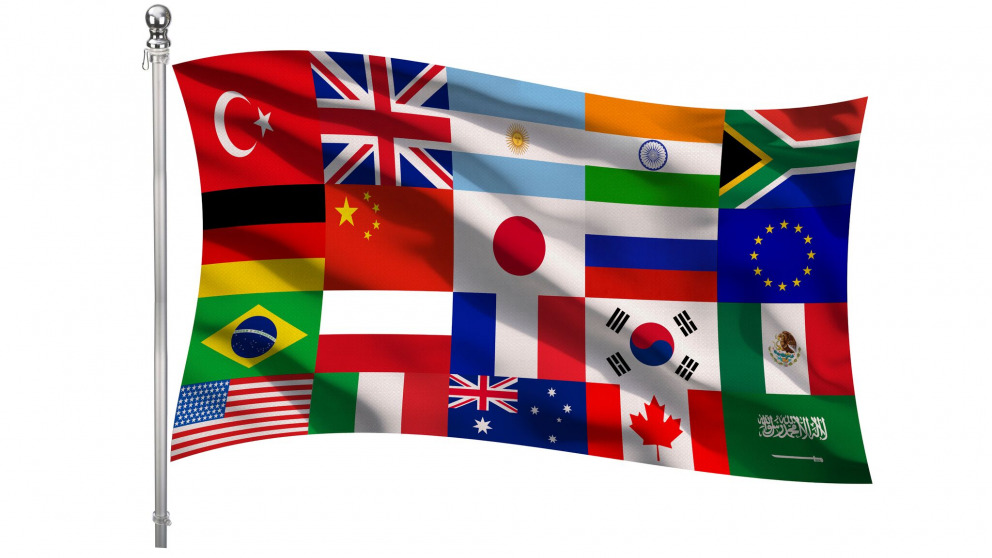Headline:
G20 Summit in Hamburg: IASS and Partners Publish Policy Recommendations
Sustainable Development

In the build up to the G20 Summit in Hamburg on 7–8 July 2017, a network of research institutes and think tanks has published a series of policy briefs providing recommendations to foster sustainable development. The network – Think T20 (T20) – plans to present the recommendations to decision-makers at the G20 Summit in Berlin in late May. The authors are seeking to support the G20 countries in their efforts to align their policies with the Paris Agreement and the 2030 Agenda for Sustainable Development.
IASS researchers contributed to six of these policy briefs:
The impacts of the energy transition on commodity markets, trade, growth, and taxes
The policy brief “Green Shift to Sustainability: Co-Benefits & Impacts of Energy Transformation on Resource Industries, Trade, Growth, and Taxes” considers how a shrinking fossil fuel sector will affect commodity markets, trade, growth, and taxes. The authors, among them R. Andreas Kraemer, Sebastian Helgenberger, Rainer Quitzow and Sonja Thielges from the IASS, recommend that a joint report on the various impacts be prepared by international institutions, including the International Renewable Energy Agency (IRENA), the International Monetary Fund (IMF), the OECD and the World Bank, and the G20 Task Force on Climate-Related Financial Disclosures. The report, they argue, should outline to the heads of state and government of the G20, and their finance ministers and central bank governors, both the costs and the economic and social benefits of a shrinking fossil sector and address misleading signals.
Improving quality of life in Africa
The policy brief “The G20’s role in improving quality of life through sustainable energy and urban infrastructure in Africa” considers issues around the development of infrastructure in Africa, with a particular focus on the energy sector. According to the authors, African cities in particular need better infrastructure to meet basic needs and develop industrialised economies. At the same time, a reliance on unsustainable, carbon-rich technologies should be avoided. According to the authors, the G20 countries could make a decisive contribution to improving quality of life in Africa by:
- aligning and cementing the G20 Agenda for Africa with African initiatives, the Sustainable Development Goals of the 2030 Agenda, and the Paris Agreement;
- mitigating economic risks related to climate change by supporting low carbon development pathways in Africa; and by
- creating and enabling a level playing field for low carbon technologies, which includes integrated strategies for de-risking renewable energy investments, and
- supporting smart and sustainable urban planning.
IASS researchers Rainer Quitzow and Sybille Röhrkasten both contributed to this publication.
The challenge of climate migration
The policy brief “Building Global Governance for ‘Climate Refugees’” addresses the issue of climate-induced migration and displacement. The publication makes a range of recommendations to improve how global institutions and international norms deal with climate-induced migration. With experts anticipating rising numbers of “climate migrants”, the G20 must act swiftly, the authors argue. Unlike many other refugees and migrants, few climate refugees will be able to return to their place of origin.
R. Andreas Kraemer and Patrick Toussaint of the IASS contributed to this policy brief.
Protecting our oceans
The G20 countries account for a substantial share of the world’s coastlines and territorial waters. The policy brief “Sustainable Ocean Economy, Innovation and Growth: A G20 Initiative for the 7th Largest Economy in the World” recommends a number of measures to protect the oceans and conserve marine resources. The policy brief emphasises the importance of effective measures to ensure the sustainable management of our oceans as sources of food, resources, and renewable and non-renewable energy. The policy brief recommends that the G20 undertake a range of initiatives to strengthen the Ocean Economy (also known as the Blue Economy). Among its authors are R. Andreas Kraemer and Torsten Thiele of the IASS.
An additional policy brief, titled “The Ocean Dimension of the 2030 Agenda: Conservation and Sustainable Use of the Ocean, Seas, and Marine Resources for Sustainable Development”, explores the challenges around ocean conservation in greater depth. IASS researchers R. Andreas Kraemer, Stefanie Schmidt, Torsten Thiele, and Sebastian Unger are among its co-authors.
Further information:
Kraemer, R. A., Carin, B., Gruenig, M., Blumenschein, F. N., Flores, R., Mathur, A., Brandi, C., Spencer, T., Helgenberger, S., Thielges, S., Vaughan, S., Whitley, S., Ruet, J., Ott, H. (2017): Green Shift to Sustainability: Co-Benefits & Impacts of Energy Transformation on Resource Industries, Trade, Growth, and Taxes. - G20 Insights - Climate Policy & Finance.
Visbeck, M., Teleki, K., Pantzar, M., Orbach, M. K., Brink, P. t., Virdin, J., Rochette, J., Hornidge, A.-K., Farmer, A., Russi, D., Thiele, T., Bakshi, R., Bhatia, R., Boteler, B., Herédia, M., Kraemer, R. A., Krüger, I., Martinez, G., Mathur, A., Pendleton, L., Cunha, T. P. e., Rustomjee, C., Vaughan, S. (2017): Sustainable Ocean Economy, Innovation and Growth: A G20 Initiative for the 7th Largest Economy in the World. - G20 Insights - Policy Briefs.
Kraemer, R. A., Mutanga, S. S., Pophiwa, N., Fetzek, S., McGlade, K., Schraven, B., Cattaneo, C., Kathuria, R., Sagar, A., Toussaint, P., Khasru, S. M., Axworthy, L., Vaughan, S., Wilkinson, E., Chevallier, R. (2017): Building Global Governance for 'Climate Refugees'. - G20 Insights - Forced Migration.
Schmidt, S., Müller, A., Rochette, J., Lubchenco, J., Neumann, B., Kraemer, R. A., Thiele, T., Unger, S., Visbeck, M. (2017): The Ocean Dimension of the 2030 Agenda: Conservation and Sustainable Use of the Ocean, Seas, and Marine Resources for Sustainable Development. - G20 Insights.
Mutanga, S. S., Quitzow, R., Steckel, J. C. (2017): The G20’s role in improving quality of life through sustainable energy and urban infrastructure in Africa. - G20 Insights - Climate Policy.


